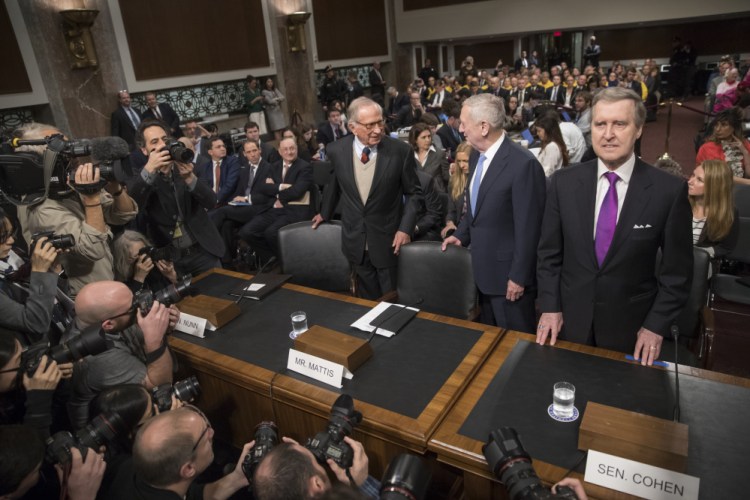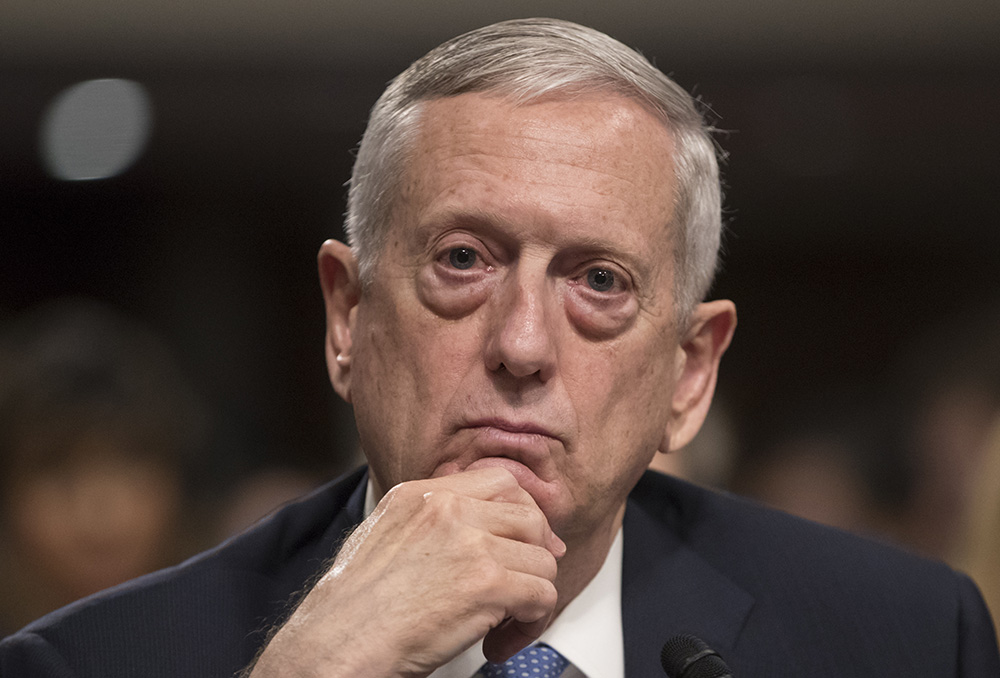WASHINGTON – Retired Gen. James Mattis won overwhelming support Thursday in a first vote to allow him to run the Pentagon after telling senators he places Russia at No. 1 on his list of security threats. He also accused Russian President Vladimir Putin is trying to “break” NATO.
The Senate Armed Services Committee voted 24-3 on a one-time exception for Mattis to serve as Donald Trump’s defense secretary. The measure is necessary because Mattis hasn’t been out of uniform for at least seven years. Democrats Kirsten Gillibrand of New York, Richard Blumenthal of Connecticut and Elizabeth Warren of Massachusetts opposed the legislation, which is expected to face votes in a House committee and the full Senate later in the day.
No career military officer has led the Pentagon since the 1950s, but even some of Trump’s strongest critics have supported the exception for Mattis.
During the hearing, Mattis portrayed Russia as a strategic adversary and said the history of U.S.-Russian relations is short on successful efforts at lasting cooperation, something President-elect Donald Trump has pledged to pursue.
While he agreed with thrust of Trump’s plan to increase the size of the U.S. military, Mattis’ views on Russia appeared dissonant with that of his potential commander-in-chief. Trump has repeatedly emphasized his hope for good relations with Putin, even as U.S. intelligence agencies have accused the Russian leader of orchestrating a campaign of interference in the 2016 U.S. election.
Of Putin, said Mattis, a former NATO military leader: “He is trying to break the North Atlantic alliance.”
HE’S EXPLAINED VIEWS TO TRUMP
He said he has explained to Trump his views on Russia, which include a deep worry that Moscow is determined to create a sphere of unstable states on its periphery through intimidation.
Mattis said he supports the Obama administration’s moves to reassure European allies after Moscow’s annexation of Ukraine’s Crimea region and military activity in eastern Ukraine. While the U.S. should remain open to working with Russia, Mattis said, the prospects for cooperation were narrowing.
The context was clear. As Mattis spoke, Trump’s choice to run the CIA, Rep. Mike Pompeo of Kansas, sided with intelligence officials who claim the Kremlin was behind the election cyberattacks, adopting a similarly tough stand against Russia. Ties between the former Cold War foes also have been strained by Syria’s civil war.
The legislation on Mattis’ exception is separate from his confirmation process, which also seems assured. He faced no hostile questions from Republicans or Democrats, receiving bipartisan praise for his reputation as a straight-talking, well-read man of integrity and intelligence.
“How about Mr. Secretary?” Rep. Lindsey Graham, R-S.C., asked him half-jokingly.
William Cohen, a defense secretary for Democratic President Bill Clinton and former U.S. senator from Maine, introduced Mattis as a “humble man with very little to be humble about.”
“He’s a man of thought as well as action,” Cohen said.
SAYS THE MILITARY ISN’T READY
Mattis said the world order is under “the biggest attack since World War II,” blaming Russia, China and international terrorist organizations for its destabilization.
Asked by Sen. John McCain, the Armed Services Committee’s Republican chairman, if the U.S. military is ready to confront these challenges, Mattis replied: “No, sir.”
On cyberattacks, Mattis noted that wars often are started by miscalculation. He said the U.S. needs to set clear boundaries so that adversaries know what the U.S. will not tolerate.
A former top commander of U.S. forces in the Middle East, Mattis said he believes Washington must “restore a better relationship” with Israel and Arab partners. Still, he declined to embrace the common Republican assertion that President Barack Obama allowed Israel’s military edge over its regional foes to erode.
In prepared testimony, Mattis said he understands his role as the Defense Department’s civilian leader would be different “in essence and in substance” from his four decades in uniform.
“The esprit de corps of our military, its can-do spirit and its obedience to civilian leadership reduces the inclination and power of the military to criticize or oppose the policy it is ultimately ordered to implement,” Mattis said. He called civilian control “a fundamental tenet of the American military tradition.”
Mattis, 66, retired in 2013 after serving as commander of U.S. Central Command in charge of all U.S. forces in the Middle East.
He is known for having strong views on Iran, but spoke of the U.S. having to honor a 2015 nuclear deal with the country. Trump has indicated he wants to renegotiate aspects of the agreement.
The last career military officer to serve as defense secretary was George Marshall in 1950-51.
Copy the Story LinkSend questions/comments to the editors.




Success. Please wait for the page to reload. If the page does not reload within 5 seconds, please refresh the page.
Enter your email and password to access comments.
Hi, to comment on stories you must . This profile is in addition to your subscription and website login.
Already have a commenting profile? .
Invalid username/password.
Please check your email to confirm and complete your registration.
Only subscribers are eligible to post comments. Please subscribe or login first for digital access. Here’s why.
Use the form below to reset your password. When you've submitted your account email, we will send an email with a reset code.